Brazil and Latin America's next challenge
- Published
- comments

Protests have spread throughout Sao Paulo and Brazil's other major cities
Large-scale protests in Brazil have rocked one of the largest and most prominent emerging economies.
On the face of it the cause is a small rise in bus fares, which has mushroomed into a range of complaints - including corruption and a lack of investment in social services compared with spending on the World Cup and Olympics.
The real cause is likely to run much deeper.
Brazil's economy has slowed down considerably over the past year, expanding by less than 2%. It feels worse by comparison with a strong decade of growth - helped by the commodity boom of the 2000s - and relatively low inflation.
For years Brazil has been feted as one of the major emerging economies - one of the fabled Brics, alongside China, India and Russia.
To top it off, it was chosen to host both the football World Cup and the next Olympics.
When the money leaves
Brazil became a destination for money seeking a better return.
Its key interest rate has averaged 8-10% in the past decade, which has offered the highest returns in the world (after taking into account inflation) for many of the years since the global crisis.
This inflow of foreign money and the country's success selling commodities led its currency to surge, which helped to keep a lid on inflation (although it did pose other problems).
But, now the picture has changed. With a few words, the Fed chairman, Ben Bernanke, has raised the prospect that the US central bank's cheap cash injections - which have fuelled billions of dollars of inflows into emerging economies - could begin to taper off in the next few meetings.
This has caused money to leave emerging economies (see my posts on the Great Reversal part I and part II). And Brazil has been hard hit.
The country's stock market has fallen by more than 20% and become a bear market. Its currency, the real, hit the weakest level in four years, at around 2.14 per US dollar.
This cheaper currency makes imports more expensive and tends to be inflationary. So much so that the central bank has just raised interest rates to combat price rises - despite the slowing of the economy.
It's a difficult economic position to be in.
Inequality
Plus, when growth slows, the signs of fracture become more apparent.
One of the enduring difficulties for Brazil and other Latin American countries is that they have the most unequal societies in the world.
As measured by the Gini coefficient - where 0 is perfect equality and 1 means that one person has all of the money - Brazil's inequality has fallen during the past decade. But it remains above 0.5, which is the wrong side of the 0.4 level that is associated with instability.
Perhaps Brazil is now confronting the next challenge for these successful emerging economies that have grown well during the past decade or so.
There are now more than 130 million people in the middle class in Latin America (and I'll be writing more about that in my post tomorrow). This larger middle class tends to demand more from the government, particularly social services and re-distribution of income.
Brazil - and other countries - are likely to find that it is easier to satisfy those demands during a boom. It's much more challenging now.
But, with the worst protests on Brazilian streets in decades, it may be that this is the right time to grasp that potentially painful nettle.